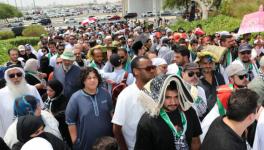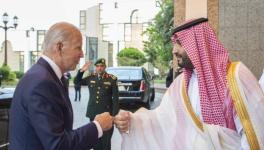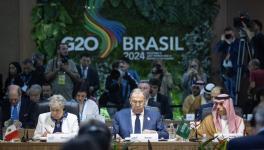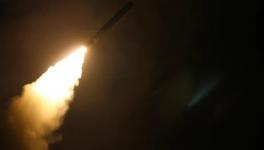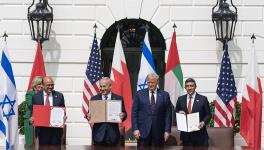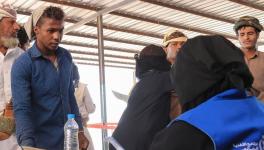War crimes and humanitarian resistance in Yemen
Comment: The situation is desperate, yet the devastating violence is being supported by the international community, which can't see what's coming next, writes Vijay Prashad.
On the last night of November, Saudi Arabia's jets pummeled Sanaa, the capital of Yemen.
The death toll is not yet clear nor is the full extent of the destruction. It is hard to measure the devastation, since Yemen has faced annihilation since March 26 of this year. The bombing has been unyielding.
What has been the outcome of this bombing? No political gains for any side in the conflict, with Saudi Arabia unable to break the back of the Yemeni forces - including the Houthis.
What is clear is that Yemen's people live in the middle of catastrophe. The UN data is sobering. The World Food Programme says that around 14 million people - half of Yemen's population - are food insecure.
Medicines are not available, food and fuel prices have skyrocketed. Malnourishment among children has grown exponentially, with half a million children now in danger of starvation.
On November 26, Human Rights Watch released a forensic report on the Saudi bombing - What Military Target Was in My Brother's House? Unlawful Coalition Airstrikes in Yemen. This report, which has been largely ignored, notes that the Saudi bombing has killed at least 2,500 civilians.
The report lists the names of these people. What is most explosive about the report is that HRW found that in ten coalition airstrikes the Saudi jets "have violated international humanitarian law, the laws of war".
In other words, the bombing of Yemen has produced several war crimes. Among them is the HRW claim that the Saudis declared entire cities - Saada and Marran, for instance - as military targets.
That these are largely civilian cities has not bothered the Saudis, nor the "international community". The report shows that this has been less a war and more a slaughter.
On July 4, Saudi jets bombed the marketplace in Muthalith Ahim, near the Saudi-Yemeni border. The raid hit shops and restaurants at 10pm, when civilians were out and about as normal.
Salem al-Mashwali, a 40-year old truck driver, witnessed the bombing: "I counted 45 bodies intact, many lying under the stalls of the qat sellers. I saw other bodies that had been shattered to bits, some already stiff. People around me were shouting. I saw the driver of the water truck, a friend of mine, and his assistant both dead in the vehicle, as it was burning. I witnessed a terrible thing, a very scary scene."
His is only one testimony, from one incident. There are too many to recount.
The HRW report follows an Amnesty International study - Bombs Fall from the Sky Day and Night: Civilians Under Fire in Northern Yemen (October 2015) - which looked at 13 deadly airstrikes.
Amnesty concluded that the Saudis and their allies had caused "serious violations of international humanitarian law". The report also points out that "more civilians have died as a result of coalition airstrikes than from any other cause during the conflict in Yemen".
In one strike on June 13 on a home in the Dammaj valley in al-Safra, Saudi aircraft killed eight children and two women from the same family.
"There were 19 people in the house when it was bombed," said Abdullah Ahmad Yahya al-Sailami, whose son was among those killed. "All but one were women and children. The children, who would usually be outside during the day, were in the house because it was lunchtime. They were all killed or injured. One of the dead was 12-day-old baby."
In October, the UN Special Envoy to Yemen, Ismail Ould Cheikh Ahmed, met with the Saudis and former Yemeni President Mansour Hadi. He urged a peace process. It was in vain.
A few days later, on October 23, Ould Cheikh Ahmed told the UN Security Council: “All parties today are aware that there can be no military solution to the conflict and that only peace talks and dialogue will pave a road to a better future."
Indifference is not a path to diplomacy. But that is what Yemen faces.
There has been no pressure on Saudi Arabia by the "international community" to cease its airstrikes and come to the negotiating table.
In fact, the opposite has taken place. The West continues to resupply the Saudis for this conflict, making it seem as if it has given Riyadh the green light for the bombardment. The US cut an arms deal with Saudi Arabia worth over $1.3 billion in November, while the UK cut its own deals with Riyadh.
Furthermore, the West has prevented any condemnation of Saudi Arabia's conduct in the UN chambers - including at the Human Rights Council. Indifference to the suffering in Yemen is scandalous.
It shows a lessening of humanity. That the West has continued to resupply Saudi Arabia shows that it too is complicit in the slaughter. The West's control over international institutions means that the "international community" will not ever take notice of the crimes against humanity and war crimes in Yemen.
Meanwhile, the small voices of history move forward.
Dr Riaz Karim and Fatik al-Rodaini formed Mona Relief in August. Their goal has been to get aid directly into the hands of the Yemeni people. Volunteers across North Yemen have drawn on whatever resources Mona Relief has been able to pull together to help tens of thousands of people.
"A quiet network of humanitarian resistance is shaping up in Yemen," said Catherine Shakdam, who works with Mona Relief and is director of Veritas. "People are increasingly relying on old trade routes to bypass main roads."
The Saudi blockade can only be broken in this way. "Of course, this has been dangerous as tribesmen are often looting convoys, demanding that people pay for the right of passage."
Humanitarian resistance is merely about survival. There is no vision for a future from these gestures. But they are essential.
The future for Yemen is bleak. Paralysis is the order of the day, as Saudi planes continue to bomb the country. The journalist Hisham al-Omeisy, who lives in Sanaa, worries for his children.
"My two boys need some shut-eye before school in a couple of hours," he writes during the bombing on the last day of November.
When the dust clears in Yemen, it will be a country in ruins. What fearful phoenix will arise from its ashes?
Vijay Prashad is a columnist at Frontline and a senior research fellow at AUB's Issam Fares Institute of Public Policy and International Affairs. His latest book is The Poorer Nations: A Possible History of the Global South (Verso, 2014 paperback). Follow him on Twitter: @VijayPrashad
Courtesy: al-Araby
Disclaimer: Opinions expressed in this article remain those of the author and do not necessarily represent those of Newsclick, its editorial board or staff.
Get the latest reports & analysis with people's perspective on Protests, movements & deep analytical videos, discussions of the current affairs in your Telegram app. Subscribe to NewsClick's Telegram channel & get Real-Time updates on stories, as they get published on our website.









